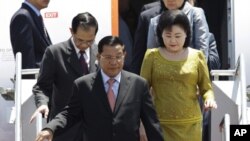In recent month, Cambodian Prime Minister Hun Sen has made a number of public speeches against broadcasters VOA Khmer and Radio Free Asia for critical coverage of his government.
“Go ahead, broadcast my speeches,” he said at a ceremony to inaugurate a bridge in Kampot province earlier this month.
He asked the crowd to point out the RFA reporter present. “Go ahead, insult me,” he said. “I won because you insulted me. The more you insult, the more you make a mistake.”
Cambodia’s broadcast media environment is overwhelmingly favorable to Hun Sen and the ruling Cambodian People’s Party. There are few independent outlets, and media experts say it is difficult to get a license for non-party aligned broadcasters.
In July, Hun Sen made more critical remarks of the two broadcasters after one reporter asked him questions concerning alleged political interference at the UN-backed Khmer Rouge tribunal. At the time, Hun Sen said he would pay reporters if they stopped working.
Such remarks could hurt Cambodia’s struggling press, said Moeun Chhean Narridh, director of the Cambodian Institute for Media Studies.
“In a country like Cambodia, where democracy is still young and press freedom is not yet strong, we’re concerned that this would affect local media institutions, and they will be afraid,” he said. “It’s a loss, first for the government, because in a democratic regime, we do need oversight and criticism from the public, especially the media that represent them.”
The US-based Freedom House considers Cambodia’s media environment “not free,” and says it is concerned the media here are “under threat,” especially with criminal defamation charges leveled against journalists who are critical of the government or powerful business interests. Cambodia’s press freedoms were ranked 128th out of 178 countries in 2010, a slide from 117th the year before.
Ek Tha, a spokesman for the government, said some criticisms from the media “are not reasonable.”
“Thinking always about the bad news is not a good thing,” he said. “They have to see the positive side more than the negative.”
However, Chan Saveth, head of investigation for the rights group Licadho, said Hun Sen’s remarks were “a form of threat.”
Threats to journalists in Cambodia are a reality. In February 2010, a reporter for RFA, Sok Serei, was charged by a Takeo provincial court after reporting on alleged corruption in a community there. Hang Chakra, the editor of a critical newspaper, Khmer Machas Srok, was jailed in 2008. Freelance reporter Ros Sokhet was also recently jailed in Siem Reap for allegedly sending threatening text messages to another broadcast personality with close ties to the ruling Cambodian People’s Party.
At least 12 journalists have been killed since 1994, following stories that were critical of powerful individuals or dug into lucrative crimes like illegal logging. The most recent was Khem Sambor, a reporter for the opposition newspaper Meakneakseakar Khmer, just ahead of the July 2008 elections, who was shot dead along with his son. No perpetrators have ever been arrested in any of those cases.
Son Chhay, a lawmaker for the opposition Sam Rainsy Party, said Cambodia’s leadership remains “inspired by the socialist regime of the 1980s.”
“We worry that this direct lash out could lead to touching the security of reporters of both radio [broadcasters],” he said.
Meanwhile, he said, other parliamentarians have suggested eliminating re-broadcasts of both VOA and RFA.
“The country’s leaders must accept the criticisms,” he added.




